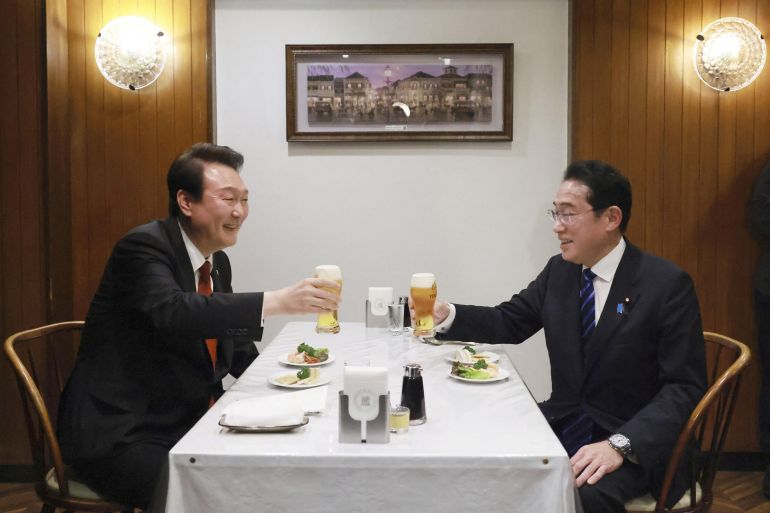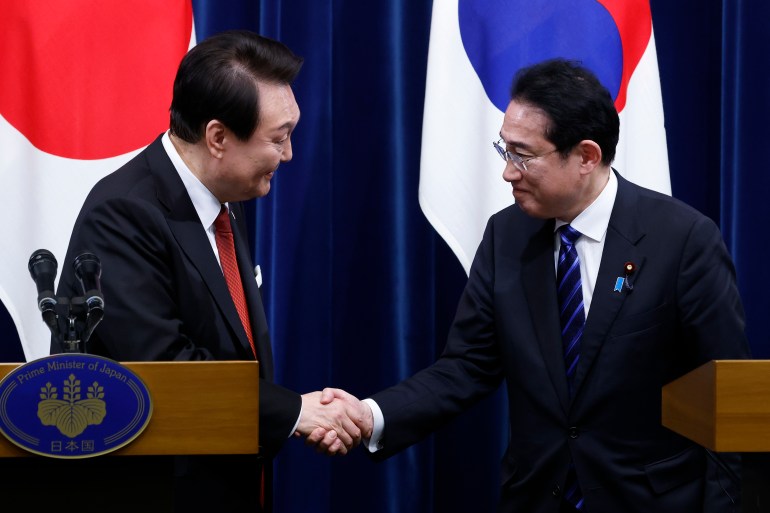Japan, South Korea move to mend ties at landmark summit
Leaders Yoon Suk-yeol and Fumio Kishida find common ground on contentious issues amid growing regional security challenges.

The leaders of Japan and South Korea were all smiles as they agreed to put a century of difficult history to one side and work together to counter regional security challenges.
The Tokyo summit between South Korea’s Yoon Suk-yeol and Japan’s Fumio Kishida – in the first visit to Japan by a South Korean president in 12 years – highlighted how the two United States allies have been brought closer by North Korea’s frequent missile launches and growing concern over China’s more assertive positioning on the international stage.
Keep reading
list of 4 itemsNorth Korea launches ICBM ahead of South Korea-Japan summit
‘Annihilate the enemy’: North Korea confirms two missile launches
North Korea fires two missiles, second test in three days
Just hours before Yoon arrived in Tokyo, North Korea test-fired a banned intercontinental ballistic missile, the latest in a series of launches over the past week.
The two leaders bonded over food and reached an agreement on some contentious issues, agreeing to revive regular bilateral visits and resume the security dialogue suspended in 2018. Yoon declared the “complete normalisation” of an intelligence-sharing pact, known as GSOMIA, which Seoul had threatened to pull out of in 2019. They also announced an end to an almost four-year trade dispute over some high-tech materials used for semiconductors.
“Strengthening Japan-South Korea ties in the current strategic environment is urgent,” Kishida told reporters at a joint press conference with Yoon after the talks.
“I hope this visit will nurture trust and friendship and significantly elevate Japan-South Korea relations.”
Japanese media said the new “shuttle diplomacy” could include Kishida inviting Yoon to the G7 summit in Hiroshima in May and then visiting Seoul.
Yoon noted the “grave threat” posed to international peace and security by North Korea’s missile launches.
“Today’s meeting with Prime Minister Kishida has a special meaning of letting the people of our two countries know that South Korea-Japan relations, which have gone through difficult times due to various pending issues, are at a new starting point,” Yoon said.
“Korea and Japan must closely cooperate in solidarity to wisely deal with these illegal threats.”

Following their summit and press conference, Kishida hosted a dinner for Yoon who had reportedly made a specific menu request: omurice, a Western-inspired Japanese comfort food featuring an omelette over rice.
Washington hailed the summit, calling Japan and South Korea “indispensable allies”.
“Improved ties between Seoul and Tokyo will help us embrace trilateral opportunities to advance our common regional and international priorities, including our vision for a free and open Indo-Pacific,” a US State Department spokesperson said. “We applaud Prime Minister Kishida and President Yoon for taking this positive step forward.”
Tensions between Japan and South Korea, which was occupied by Japan between 1910 and 1945, have long undermined US-led efforts to present a united front against China and North Korea.
“The fact that President Yoon visited Japan and the two countries held a bilateral meeting – rather than on the sidelines of an international forum – that alone should be commended as a possible turning point,” said Hideki Okuzono, an international relations professor at the University of Shizuoka.
Relations deteriorated sharply after South Korea’s Supreme Court in 2018 ordered Japanese firms to compensate victims of wartime forced labour but, in a sign of a breakthrough for bilateral relations, Seoul this month announced a plan to pay those affected without Tokyo’s involvement.
But Yoon faces scepticism over the rapprochement at home.
A poll by Gallup Korea published on Friday found 64 percent of respondents felt there was no need to rush to improve ties with Japan if there was no change in its attitude, while 85 percent said they thought the Japanese government was not apologetic about the country’s colonial history.
On Thursday, two South Korean victims of wartime forced labour filed a lawsuit, seeking compensation from Japan’s Mitsubishi Heavy Industries, according to their representatives.
“It is meaningful that Korea-Japan relations are finally starting to normalise but it becomes a bit complicated in terms of outcome,” Park Won-gon, professor of North Korean studies at Seoul’s Ewha University told the AFP news agency.
“It all breaks down to at what level Prime Minister Kishida will be willing to apologise for the history.”
Japan has argued that colonial-era disputes from forced labour to the use of Korean women as wartime sex slaves were settled in 1965 when diplomatic ties were normalised and Tokyo gave Seoul loans as well as economic aid equivalent to several billion dollars today.
Japan has said it continues to endorse its historic apologies for wartime acts but many in South Korea feel that is not enough.